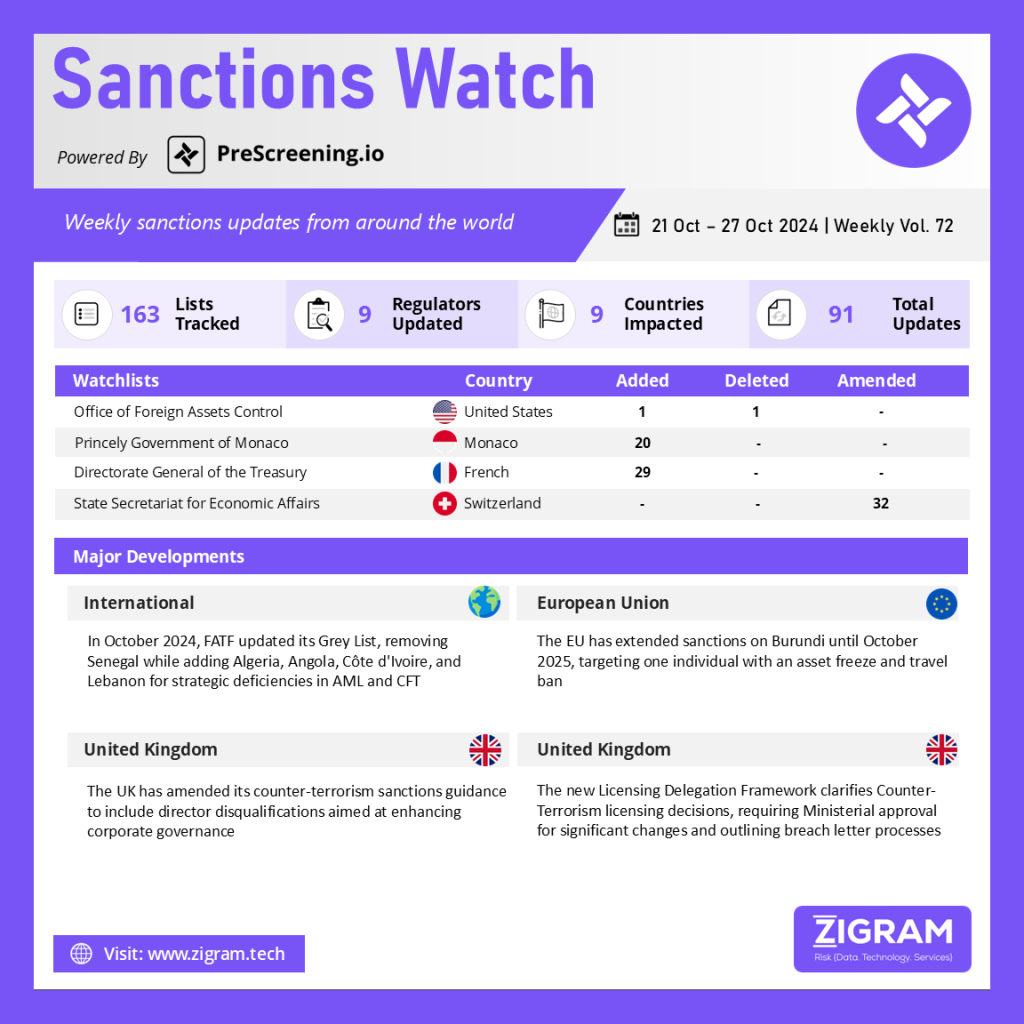Sanctions Watch Vol 72
In the latest edition of our Sanctions Watch weekly digest, we pressent significant updates on sanction watchlists and regulatory developments.
1. FATF Grey List Update October 2024: Senegal Removed, While Lebanon, Algeria, Angola, and Côte d’Ivoire Added
The Financial Action Task Force (FATF) updated its Grey List in October 2024, removing Senegal and adding Algeria, Angola, Côte d’Ivoire, and Lebanon. This list, known formally as “Jurisdictions under Increased Monitoring,” includes countries working with FATF to address strategic deficiencies in their Anti-Money Laundering (AML), Combating the Financing of Terrorism (CFT), and Counter-Proliferation Financing (CPF) regimes. Senegal’s removal from the list reflects its progress in strengthening its AML/CFT/CPF measures.
Following the new additions, entities working with individuals or businesses in Algeria, Angola, Côte d’Ivoire, and Lebanon are advised to adjust their AML policies and conduct enhanced Customer Due Diligence.
The plenary also included other significant developments. FATF adopted a mutual evaluation report of Argentina in cooperation with GAFILAT, recognizing Argentina’s AML/CFT/CPF improvements, and similarly recognized Oman’s positive compliance steps in a FATF-MENAFATF assessment. Revisions to FATF’s guidance on national money laundering risk assessments were also adopted. FATF is also expanding its support for regional bodies to ensure consistent evaluations and has invited Senegal and the Cayman Islands to participate in the FATF, enhancing regional engagement.
2. UK Updates Counter-Terrorism Sanctions Guidance to Include Director Disqualifications
The UK’s updated counter-terrorism sanctions guidance for including new measures on director disqualification for designated persons. Under the amended guidance, it is an offence for individuals subject to sanctions to act as directors of UK companies without appropriate licensing. This aims to ensure compliance with broader counter-terrorism measures. The guidance also specifies that Companies House, as the UK’s registrar of companies, is responsible for preventing the registration of directors who are disqualified under sanctions. Furthermore, it clarifies that breaches related to director disqualification sanctions are subject to penalties as outlined in the Company Directors Disqualification Act of 1986.
Designated persons, those specifically identified in sanctions lists, are advised not to take on director roles unless they have obtained the necessary permissions or licences. These changes underscore the importance of regulated governance and reflect the UK’s ongoing efforts to align corporate responsibilities with counter-terrorism objectives. The new guidance is intended to prevent those under specific sanctions from holding positions of control within UK companies, supporting the country’s broader efforts to maintain corporate integrity and security compliance within its business environment.
3. EU Extends Burundi Sanctions for Another Year Until October 2025
The European Council has extended its restrictive measures on Burundi until October 31, 2025, in response to the ongoing situation in the country. These measures target a single individual, who faces an asset freeze, prohibiting EU citizens and companies from providing him with financial resources. Additionally, this person is subject to a travel ban, preventing entry into or transit through any EU member states.
The EU continues to closely monitor the situation in Burundi, with the potential to adjust its sanctions policy as needed. Changes could involve modifying the sanctions framework or updating the list of persons, entities, and bodies subject to these measures, depending on developments in Burundi. The EU’s approach highlights its ongoing commitment to responding to circumstances in the region while balancing any shifts in the local situation with its broader policies.
4. New Licensing Delegation Framework Introduced to Strengthen Counter-Terrorism Efforts
The Delegation Framework (DF) provides guidance on licensing decisions related to Counter-Terrorism (CT) regimes, specifically outlining circumstances that do not qualify as a ‘significant change’ for new licenses or amendments. When the Minister has delegated licensing powers to a Senior Civil Servant (SCS), applications involving significant changes to a designated person’s (DP) authorizations will require Ministerial approval, as they will be considered contentious by default. The framework also details the current process for issuing breach letters and helps CT caseworkers identify the appropriate decision-maker. The SCS is authorized to approve specific applications, such as access to state benefits, low-risk one-off activities, and repayments from previously licensed sources assessed as low risk.
The Head of Counter-Terrorism CT (G6) is responsible for signing off on minor corrections, administrative amendments, and certain breach letters. However, more complex breach letters will undergo SCS oversight due to their higher potential for reputational and legal risk. Any particularly contentious breaches will be escalated to the Director of OFSI for further review.
Know more about the product: PreScreening.io
Click here to book a free demo.
Sanctions Watch is a weekly recap of events and news related to sanctions around the world.
- #FATF
- #GreyList
- #TerrorismFinancing
- #FinancialRegulation
- #CounterTerrorism
- #DirectorDisqualification
- #ComplianceMeasures
- #BusinessIntegrity
- #RegulatoryFramework
- #CTRegimes
- #GovernmentPolicy
- #RegulatoryCompliance
- #GlobalSecurity
- #SanctionsWatch
- #InternationalSanctions
- #EconomicSanctions
- #RegulatoryCompliance
- #TradeCompliance
- #SanctionsEnforcement
- #SanctionsViolations
